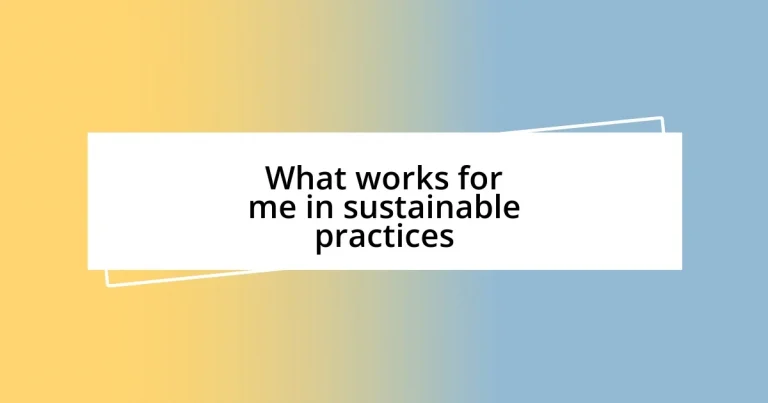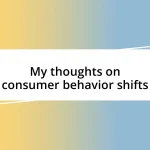Key takeaways:
- Sustainable practices require reflection on personal values and setting meaningful goals, which can lead to impactful lifestyle changes, such as reducing carbon footprints.
- Regularly evaluating habits, using checklists, and making adjustments help track progress and implement effective sustainable strategies, like efficient water use and energy-saving practices.
- Sharing successes and learning from failures promotes community engagement and inspires others to adopt sustainable practices, creating a ripple effect of positive change.
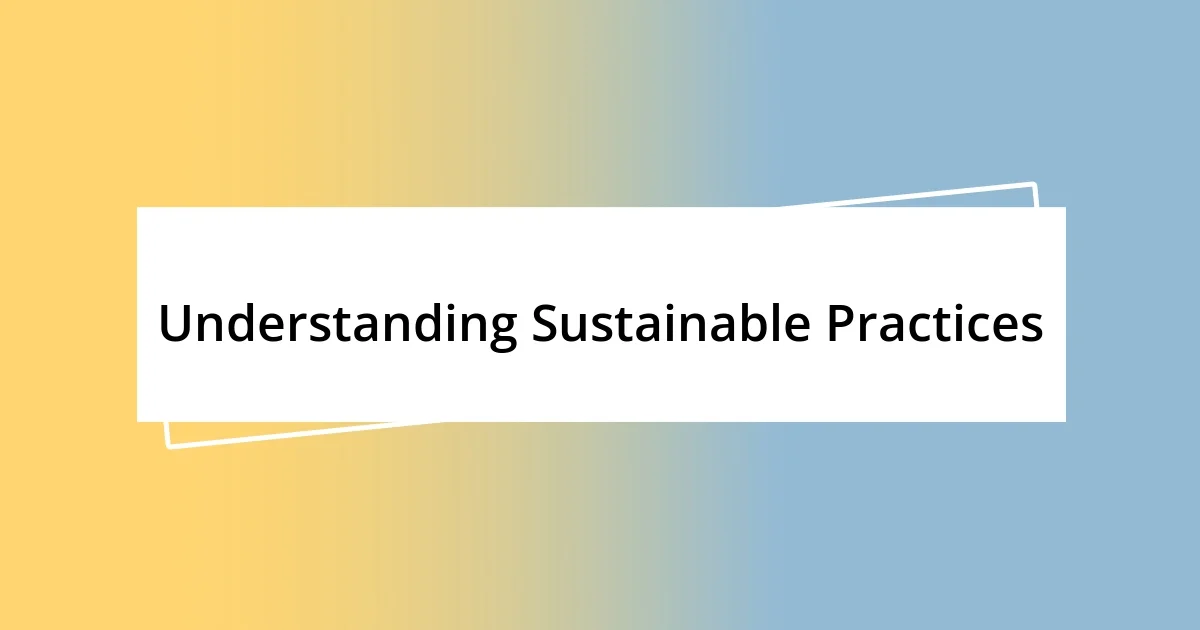
Understanding Sustainable Practices
Sustainable practices are all about finding balance—how we can meet our current needs without compromising the ability of future generations to meet theirs. I remember the first time I realized the impact of my daily choices. While shopping for groceries, I was struck by how many items came wrapped in plastic. It made me wonder, “How many of these choices are truly sustainable?”
One core element of sustainability is the concept of reducing waste. I began composting food scraps in my backyard, and it was nothing short of transformative. Watching food waste break down and enrich my garden showed me how nature can heal itself when given a chance. Isn’t it fascinating how a small shift in our habits can have such a profound effect on the environment around us?
Understanding sustainable practices also means recognizing the interconnectedness of our actions. I’ve often pondered how my energy consumption impacts the planet, leading me to experiment with switching to renewable energy sources. The first time I felt the difference in my electricity bill while knowing I was making a positive impact felt incredible. How often do we consider the ripple effect of our choices on both our lives and the world?
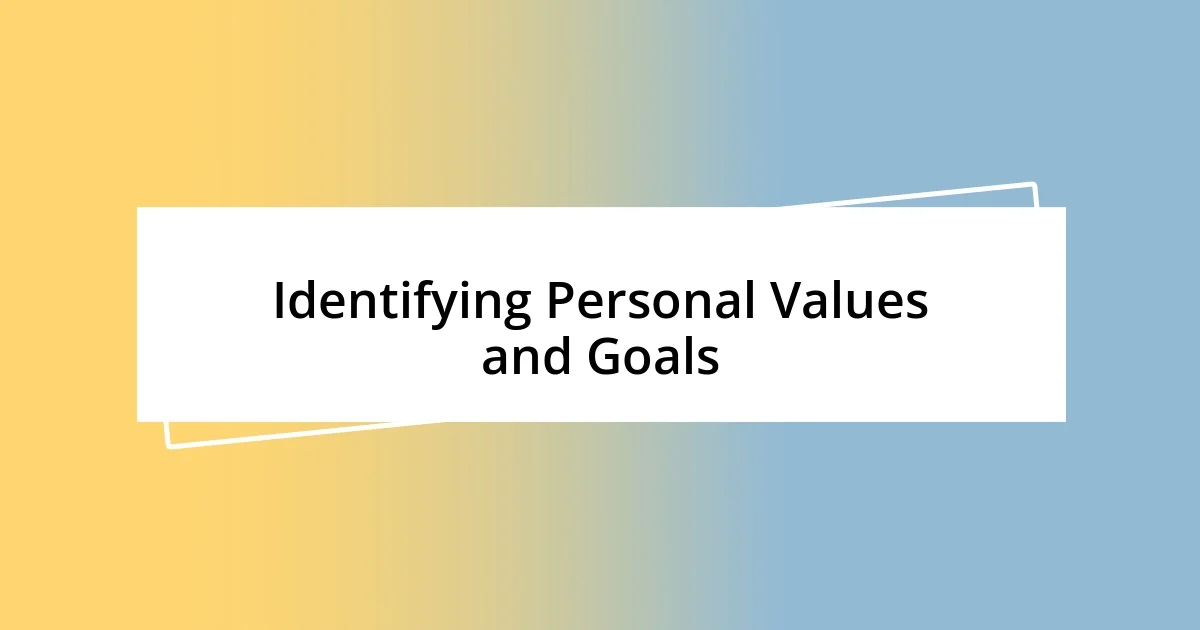
Identifying Personal Values and Goals
Identifying personal values and goals is a critical step in sustainable living. I remember sitting down one afternoon and reflecting on what truly mattered to me. I realized that my love for nature and commitment to family were guiding my choices. This clarity helped shape my sustainable practices; for example, I now prioritize purchasing products that are both eco-friendly and support local businesses.
Setting specific goals rooted in personal values makes the journey more meaningful. For instance, I decided to reduce my carbon footprint by biking instead of driving when possible. This wasn’t just a transportation choice; it became a way to reconnect with my surroundings and spend quality time with my kids, who now enjoy our cycling adventures together. Can you think of a goal that aligns with your values? What steps can you take to incorporate sustainability more deeply into your life?
When we take the time to explore our values, we often find unexpected motivations for our choices. I used to feel like recycling was a chore until I connected it to my passion for a cleaner planet for future generations. This newfound perspective turned every recycled bottle into a small victory in my quest for sustainability. Have you discovered how your values can deepen your commitment to sustainable practices?
| Values | Examples of Goals |
|---|---|
| Connection to Nature | Spend more time outdoors; support conservation projects |
| Health and Well-being | Choose organic foods; reduce processed items |
| Community Engagement | Participate in local clean-ups; shop at farmers’ markets |
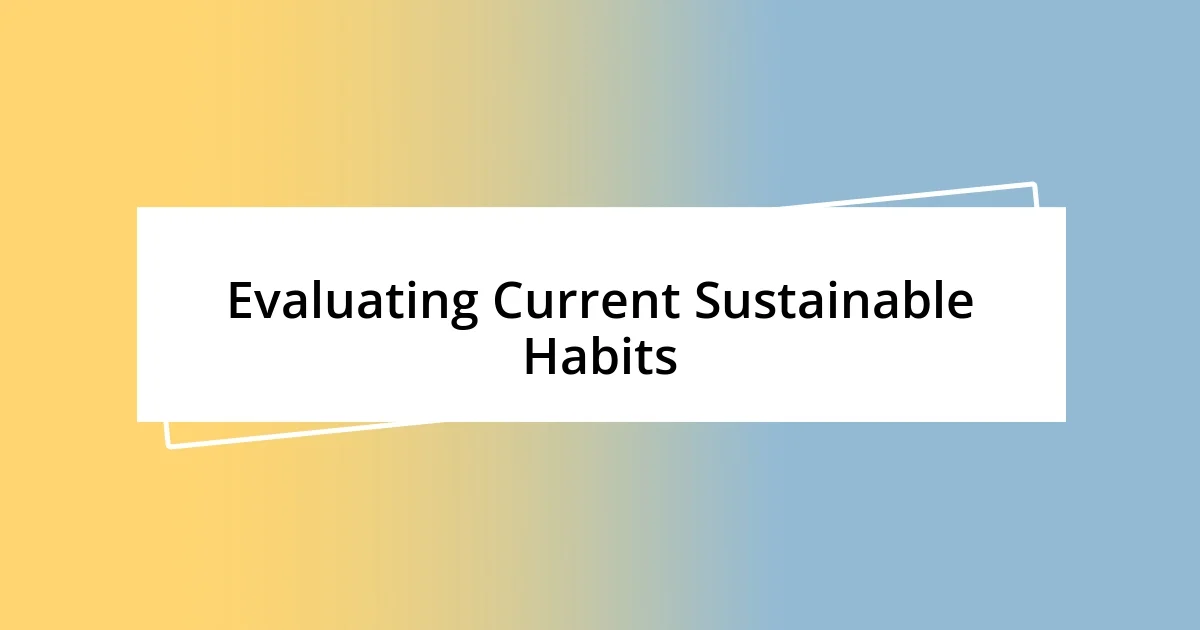
Evaluating Current Sustainable Habits
Evaluating my current sustainable habits has been a reflective journey. There was a moment when I decided to audit my pantry, and I was taken aback by the number of products that weren’t sustainably sourced. This realization prompted me to think critically about what I consume and why. It’s about being mindful—not just of what goes into my body, but also of how it affects the environment and the community.
Here’s a simple checklist I created to evaluate my habits more effectively:
- Packaging: Are most items in recyclable or compostable materials?
- Source: Am I choosing local and organic products when possible?
- Transportation: How often do I rely on single-use vehicles instead of opting for biking or public transport?
- Water Usage: Am I conscious of my water consumption while cooking, bathing, or watering my plants?
- Energy Efficiency: Are my appliances energy-efficient, and do I make a habit of unplugging devices when not in use?
Reflecting on these questions allowed me to identify specific habits that align with sustainable living. For instance, I discovered how frequently I used the dryer instead of air-drying clothes. Switching to line drying has not only cut my energy bill but also infused a comforting routine into my day. It feels rewarding to see my clothes flutter in the wind while I sip my morning coffee, embracing the simplicity of nature.
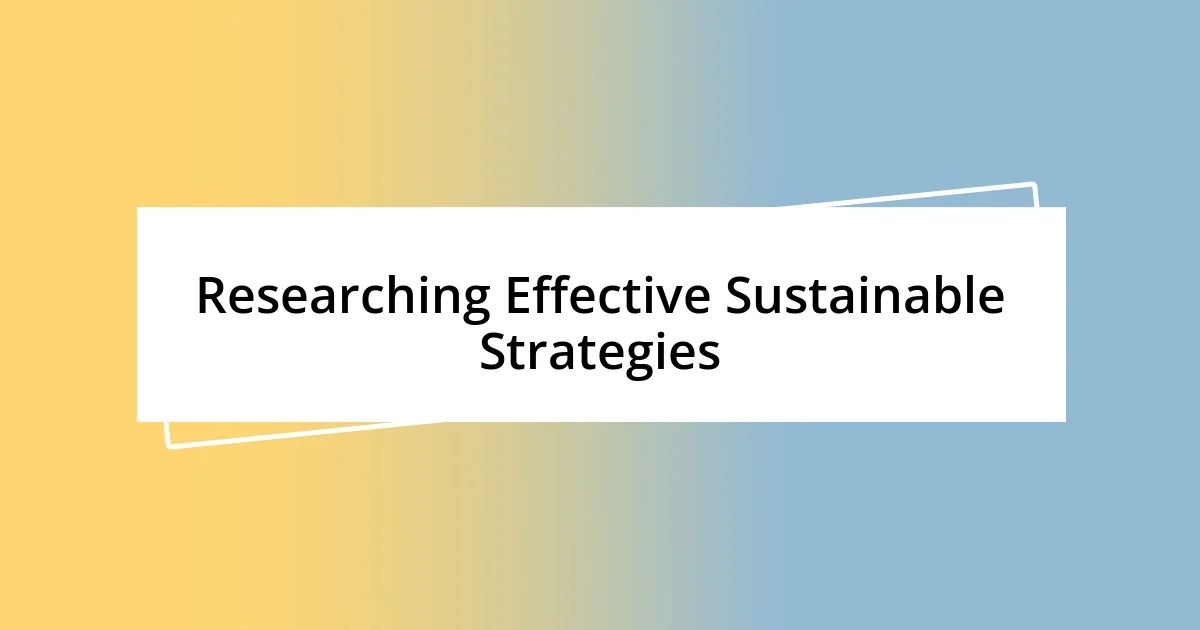
Researching Effective Sustainable Strategies
Researching effective sustainable strategies is a fascinating process that encourages creativity in finding solutions. When I delved into various resources, I stumbled upon community forums that showcased real-life experiences and methods people were implementing. This type of grassroots information can be eye-opening! Have you ever read about someone else’s journey and thought, “I can try that?”
I remember attending a local sustainability workshop where the speaker shared her experience with upcycling. She transformed discarded materials into beautiful, functional art pieces. Inspired, I decided to explore upcycling at home too! As I began to repurpose items like mason jars and fabric scraps, I not only reduced waste but also discovered a new hobby that brought joy and purpose into my life. Isn’t it incredible how researching other people’s successes can spark personal transformations?
Moreover, I’ve found that accessing academic studies and reports gives a broader perspective on environmental impacts. Recently, I came across a study about the benefits of plant-based diets not only for health but also for reducing greenhouse gas emissions. I experimented with integrating more plant-based meals into my family’s diet. As we gathered around the dinner table sharing new recipes, I realized that sustainability could also foster deeper connections. What strategies have caught your interest lately?
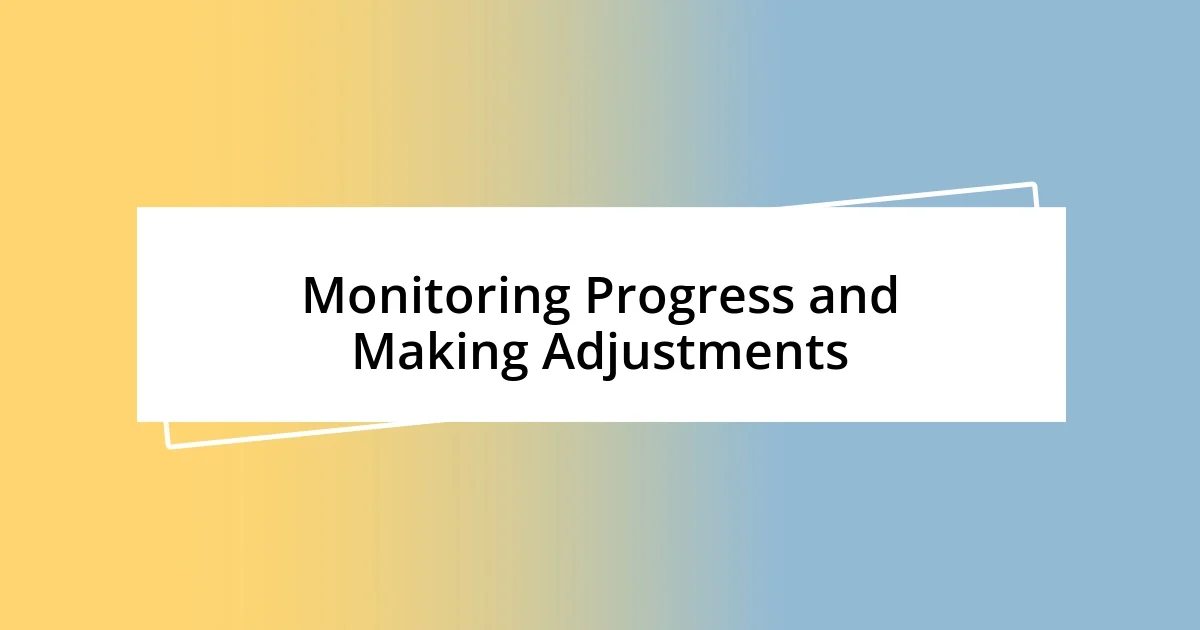
Monitoring Progress and Making Adjustments
Keeping an eye on my progress is an essential part of my sustainable journey. I regularly review my checklist to see where I’m succeeding and what still needs work. Just the other day, I noticed that while my packaging choices improved, my energy consumption still lingered in the realm of convenience. Have you ever felt that twinge of guilt when you realize you could do better? I certainly have.
Making adjustments based on my findings has been both enlightening and occasionally frustrating. For example, after assessing my water usage, I decided to incorporate shorter showers and water-efficient fixtures. At first, the desire to slip back into old habits crept in. But I reminded myself how satisfying it felt to take tangible steps toward sustainability. I kept a journal documenting my progress, and seeing my efforts in writing became a motivating factor. It’s amazing how writing down my thoughts solidified my commitment—maybe it could help you too!
Life isn’t static, and neither are my sustainable practices. I celebrate small wins, like switching to a reusable coffee cup, but also tackle setbacks head-on, such as my recent struggle with food waste. To address this, I’ve embraced meal prepping and composting. It felt so rewarding to watch my compost bin fill up with scraps, knowing I’m contributing to healthy soil. What adjustments have you made that turned out to be surprisingly effective? I bet there’s plenty of untapped potential in your own practices that could lead you to success!
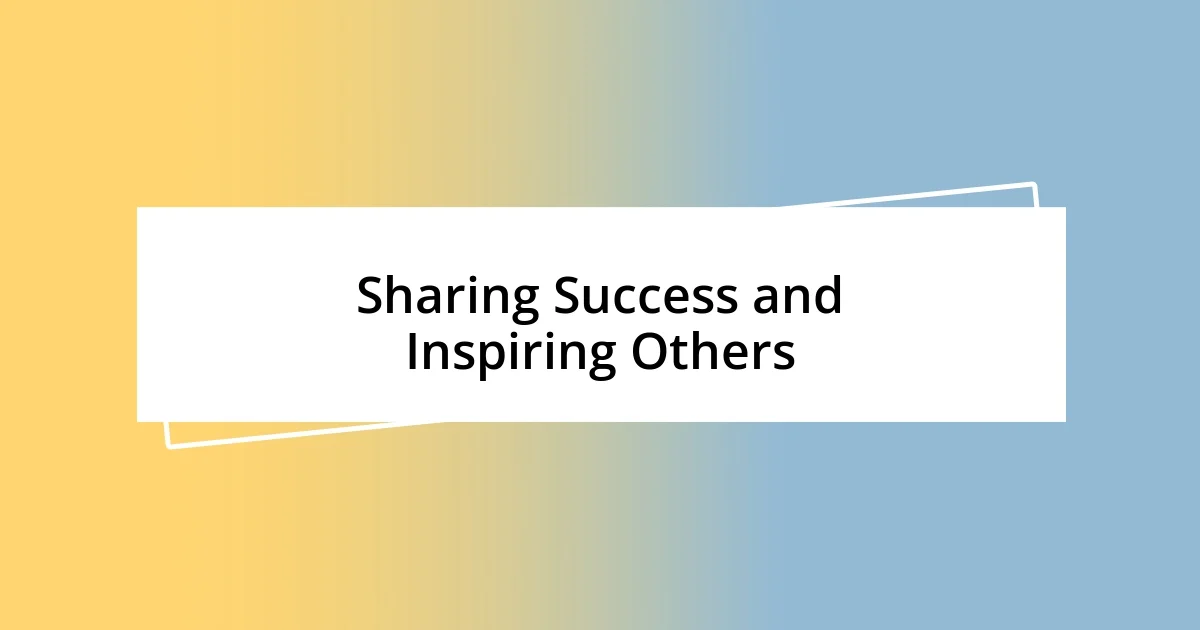
Sharing Success and Inspiring Others
Sharing my successes in sustainable practices with others has not only been rewarding but also a powerful way to motivate change. I recall hosting a small gathering where I shared my journey into zero-waste living. The diverse stories from my friends created an atmosphere of hope and possibility. It was heartening to see how a simple discussion inspired someone to start composting and another to switch to cloth napkins. Have you experienced a moment where your story encouraged someone else to take action?
On social media, I love sharing little wins, like my successful attempts at growing herbs on my windowsill. Each photo gets reactions and questions, creating a community of budding green thumbs. It astonishes me how often people respond with their experiments or seek advice. When we share our successes, we spark curiosity in others—what if the little green sprouts on my windowsill inspire someone to grow their own food? It’s in these conversations that I see the ripple effect of sustainability unfold.
I’ve also learned that even failures can hold immense value. A friend recently shared a mishap with DIY cleaning products that didn’t quite work out. Instead of feeling discouraged, we turned it into a learning opportunity, leading a discussion on safe and effective alternatives. How incredible is it that through sharing both triumphs and challenges, we can create an environment that encourages continuous improvement? After all, we’re all on this journey together, supporting one another with our experiences and insights.












